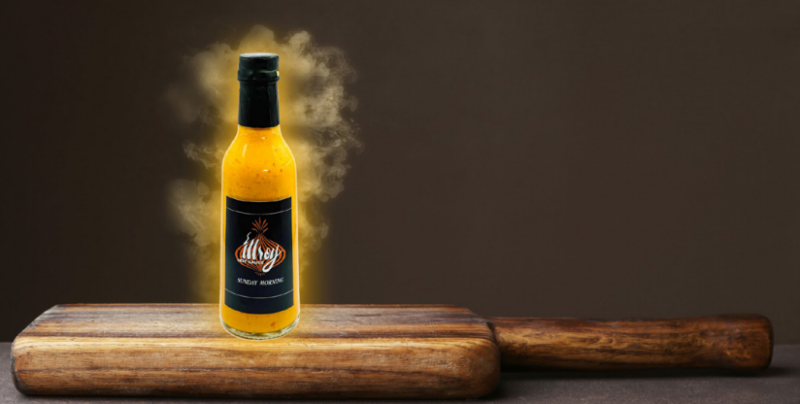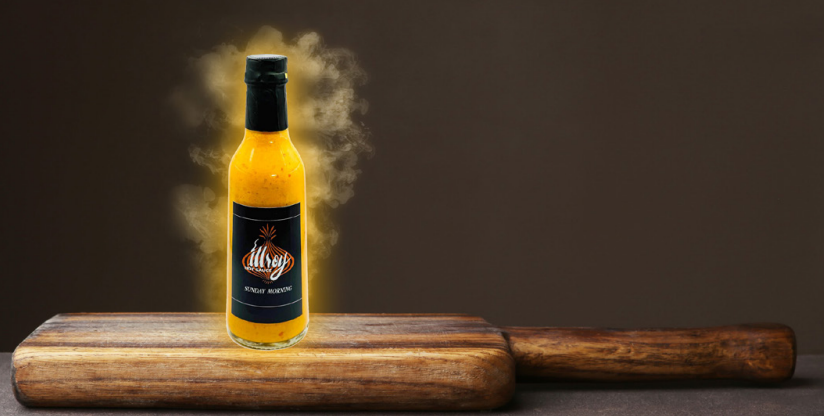For the Love of Heat
For the Love of Heat
When Rory Pete II, creator of Illroy Hot Sauce in Gilroy, had to give up spicy food due to acid reflux, it was the most miserable time of his life. So miserable, in fact, that he decided he was going to keep eating spicy food regardless. Rory isn’t alone. For many people, spiciness is as important as food itself. But why? Why do some people love the burn while others think it’s too much?
The distinct burning pain caused by chili peppers has given rise to a number of misconceptions. Some say it can burn holes in your stomach, cause ulcers, or kill your tastebuds. In reality, that burning sensation is just a trick of the brain and poses no physical harm to a well-functioning digestive system. Capsaicin, the chemical component that gives chili peppers their kick, excites the pain receptors in our mouths responsible for telling us when something is hot. It gets our brains to scream “fire!” even though there isn’t one.
People who deliberately induce this pain response by eating spicy food engage in a behavior called “benign masochism” according to Paul Rozin of the University of Pennsylvania. Intellectually, we know that we’re safe, but our brain behaves like we’re in danger—sweating, faster heart rate, watering eyes, runny nose—resulting in an endorphin rush. We get a similar experience from a runner’s high or watching horror films. It’s the sensation of triumphing over danger without the actual danger, a feeling Rory knows all too well. “It makes you feel accomplished. Like, ‘yeah, I did it!’ And then you’re like, ‘do I do it again, though?’” he laughed, “Chances are I’ll probably do it again.”
It is often thought that loving spiciness is tied to an adventurous, thrill-seeking personality. While there is no definitive proof of this, research reported by the National Library of Medicine found a correlation between chili lovers and sensitivity to reward and sensation seeking personality traits. Sensation seekers care more about the feeling of an experience. They use their bodies to test the limits, push themselves, and feel something intense. Sensitivity to reward, on the other hand, is about the attention received from peers, or the “machismo” perception of strength from enduring the pain.


But what starts us on the path to loving spiciness in the first place? For that, we have nature and nurture to blame. An international study of spice use in cooking done by biologists at Cornell University found that spicy cuisine was linked to hotter climates. Places like Thailand, the Philippines, India, and Malaysia were at the top of the spicy food/hot climate list, while cold places like Sweden, Finland, and Norway were at the bottom. Hotter climates are known for having a greater prevalence of bacteria, and Cornell researchers found that the capsaicin in hot peppers kill or inhibit up to 75 percent of bacteria and fungi. Before refrigeration, food-borne microbes were an even more serious threat than they are today, and regions that used capsaicin in their food had more protection from these illnesses. Paul W. Sherman, an evolutionary biologist and professor of neurobiology and behavior at Cornell University, explained, “traits that are beneficial are transmitted both culturally and genetically, and that includes taste receptors in our mouths and taste for certain flavors. People who enjoyed food with antibacterial spices probably were healthier, especially in hot climates. They lived longer and left more offspring.”
The same correlation can be seen in places like America, where states with hotter climates tend towards hotter cuisine, while colder areas have milder foods. The origins of Rory’s love of spiciness fit with this as well, “My dad’s from Louisiana and spicy food has always been a thing for him. I would eat his food, and it always had some kind of hot sauce in it. I don’t remember not liking it, honestly.”
Now that the days are hotter, it’s the perfect time for chili lovers to shine. For that, Rory Pete II has you covered. He has created an orange hot sauce reminiscent of the ones found in his favorite Mexican restaurants in San Jose. His blend is unique, keeping people with diabetes or high blood pressure in mind. “I’m sure there’s a lot of people who can’t have hot sauce because it has too much salt or sugar. So I got rid of it so that everyone can have it,” he said.
So far, his business is still small, but he intends to get his Illroy Hot Sauce to as many people as possible. After all, great accomplishments begin with a fiery heart.







